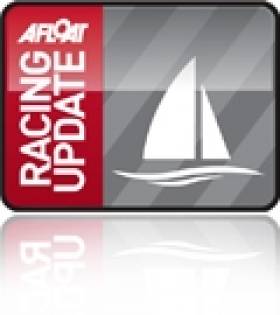Displaying items by tag: Topper
Lynch is Top Topper in Carlingford
A fleet of 66 Toppers took to the waters of Carlingford Lough for their National Championships ten days ago, with Blessington sailor Finn Lynch taking control of the series to count nothing but podium finishes on his way to the national title.
In the 4.2 rig fleet, Strngford sailor Peter Gilmore burst out of the traps with four straight bullets in the first four races of the series giving him an unassailable lead.
Lynch's top challenger in the 58-boat full rig fleet was Robbie Robinson from Plymouth, who posted two bullets but couldn't match the consistency of Lynch.
The results (slightly confusing due to mixed classes) are HERE.
Topper Youth Receives Award
The ceremony, which recognises sports from GAA and Rugby, to Waterpolo and Sailing took place with students, parents, teachers and governing bodies seated together at tables in the Hogan Stand of Croke Park.
Des Cahill, RTE sports presenter, kept the crowd entertained acting as MC for the event. Luke Fitzgerald, Irish rugby star and Ciaran Whelan, former Dublin GAA star presented the awards to the young sports stars including Blessington Sailing Club's Finn Lynch.
The Lynch family have been active participants of the ISA Performance Pathway in previous years with Finn's older brother's Ben and Rory also doing very well in sailing. The fourteen year old talented sportsman was previously presented with a special award from his school, St. Mary's Academy, CBS, Carlow for his outstanding sailing achievements last year.
Finn Lynch has secured several firsts at sailing championships along with being the first ever Irish sailor to win a UK Topper event. Lynch also cleared up at the ISA Youth Nationals winning seven out of eleven races in Schull this year and came second overall at the Gul Topper Worlds in 2009.
Finn was delighted with his achievement and proudly left with his Evening Herald Young Sports Star of the year award and newspaper sports bio.
The Evening Herald were thanked for recognising and supporting school sports in their weekly column and at the awards ceremony yesterday.






























































